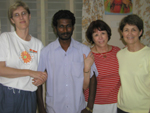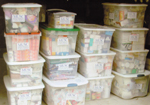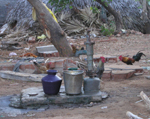Tsunami victims grateful for contributions
by Dick PetersonPublic Relations
Blue plastic tarpaulins fashioned as makeshift shelters and dotting tsunami-ravaged beaches greeted College of Nursing professor Susan Benedict, Ph.D., and her companions on their late-January visit to India.
 Dr.
Susan Benedict, third from left, stands with team member Abbi Beckford,
left, a Dalit teacher, and team member Jane McDonnold.
Dr.
Susan Benedict, third from left, stands with team member Abbi Beckford,
left, a Dalit teacher, and team member Jane McDonnold.
Although the trip, scheduled before the earthquake-spawned disaster on Dec. 26, was her third to the region, she said she was unprepared for the sight of so many people living in such desperate conditions, with little food and their means of living swept away with the receding waves.
“Most of these people earn their living from the sea. They’re fishermen,” Benedict said. “And now their boats and nets are gone.” She described dead brown vegetation everywhere the salt water spread.
She said that while the people needed medical attention, shelter, food and improved sanitary conditions, their request was for financial support to replace their fishing nets and boats.
“What really inspired us is that the people who have lost everything and who live like refugees in their own homeland want to live with dignity by going back to their work,” said Rev. Benjamin Chinnappan in a written report of the activities of this tsunami relief team from the U.S. “They would like to continue their livelihood by earning their daily bread. But they do not have fishing nets and boats. If we can provide them, they can start their work all over again.”
 These
crates, filled with medicines and other medical supplies from the MUSC
community, are ready for shipment to tsunami camps on India's southern
coast.
These
crates, filled with medicines and other medical supplies from the MUSC
community, are ready for shipment to tsunami camps on India's southern
coast.
Benedict and her team of six hauled 32 crates of desperately needed medical and other supplies to the southern coastal region of India to care for the health needs of the people affected by the tsunami in the southern state of Tamil Nadu. All of the supplies were contributed by MUSC and residents of the Lowcountry. The supplies were distributed by the team in three different “tsunami camps” housing approximately 1,000 people.
“The people were extremely grateful for the supplies,” Benedict said. “They were surprised that the Americans had heard of the disaster and had responded so generously.”
 Temporary
shelters try to reclaim the sands of beaches in southern India swept clean
by the Dec. 26 tsunami.
Temporary
shelters try to reclaim the sands of beaches in southern India swept clean
by the Dec. 26 tsunami.
In some camps, the plastic tents housed two families—a total of 10 people—in each. “The heat was oppressive in January and will reach 120 by April.” Benedict said that sanitation facilities were lacking and the team worked with the residents to establish clean areas and a process for garbage disposal. This process was essential to rid the camp of feral dogs and hordes of flies that were attracted to the raw garbage.
 Food
preparation becomes primitive in the aftermath of the tsunami.
Food
preparation becomes primitive in the aftermath of the tsunami.
With funds contributed by MUSC personnel and Lowcountry residents, the team purchased covered plastic containers for garbage for each tent and arranged for daily garbage pickup and burning, she said. Additional covered plastic containers for the government’s allotment of rice were also provided to each family.
“These are lovely people who remained gracious in spite of their circumstances,”
Benedict said.
Friday, March 18, 2005
Catalyst Online is published weekly, updated
as needed and improved from time to time by the MUSC Office of Public Relations
for the faculty, employees and students of the Medical University of South
Carolina. Catalyst Online editor, Kim Draughn, can be reached at 792-4107
or by email, catalyst@musc.edu. Editorial copy can be submitted to Catalyst
Online and to The Catalyst in print by fax, 792-6723, or by email to petersnd@musc.edu
or catalyst@musc.edu. To place an ad in The Catalyst hardcopy, call Community
Press at 849-1778.